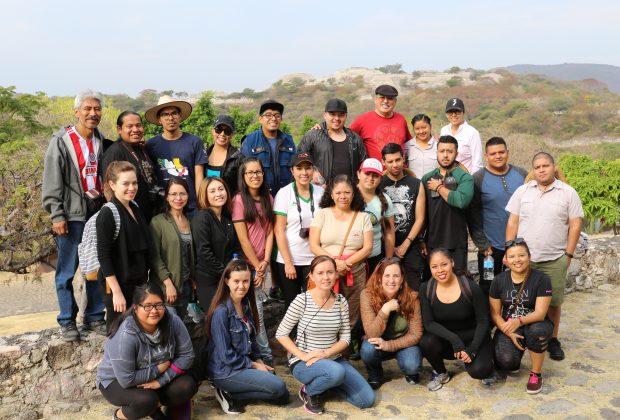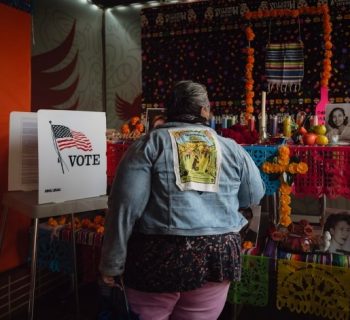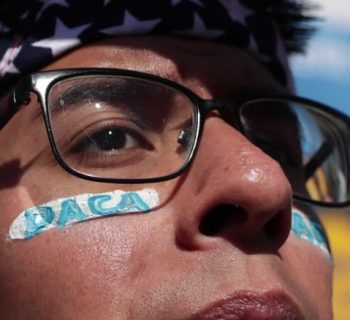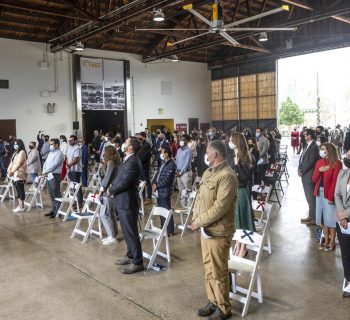APRIL 09, 2017

Yahaira Morales Castro, a current DACA student at the University of Texas
Like many college students who return from a life-changing study trip abroad, Yahaira Morales Castro couldn’t wait to go back to Mexico City. But her decision to embark on another trip is fraught with dangers that few of her classmates face.
Ms. Morales Castro’s family brought her to this country when she was 2 and then overstayed their visas. As an undocumented student, she now runs the risk that she won’t be allowed back in if the Trump administration’s stance on so-called Dreamers changes.
It’s a chance that she and a number of undocumented students are willing to take, even when their own universities and advisers are cautioning them to stay in the United States.
"I’m always gambling with risks, but I felt like I wasn’t done learning about myself and where I came from," says Ms. Morales Castro, a 20-year-old junior who is majoring in social work at the University of Texas’s flagship here.
'Dreamers' are often advised not to leave the country, for fear that they won't be allowed to re-enter. Some of them are taking the risk anyway.
In January, just before President Trump’s inauguration, she returned to Tlalnepantla de Baz, a town north of Mexico City where she was born. That visit was a highlight of her trip, which was sponsored by the Jaime Lucero Mexican Studies Institute at the City University of New York’s Lehman College and El Colegio de México.
As she explored the neighborhood with her grandmother, walking by brightly painted apartments with dogs barking from the roofs, feasting on pescaditos fritos, or fried fish strips, "I had a weird sense of nostalgia for something that never really existed in my memory," she says.
Some undocumented students who study abroad are emboldened by the fact that President Trump, who campaigned on a promise to eliminate programs like Deferred Action for Childhood Arrivals, or DACA, has so far left the program untouched. The policy, adopted by the Obama administration in 2012, has allowed more than 740,000 immigrants to study and work in this country on two-year renewable terms.
With DACA, students can apply for a status called "advance parole," which allows them to leave the country and come back if their trip is for educational, employment, or humanitarian purposes.
Mr. Trump’s pronouncement since he took office that he will deal with the DACA situation "with heart" has led many to believe that if he does discontinue the program, he’ll let the current permits expire. Ms. Morales Castro’s isn’t up until October 2018, so she feels reasonably confident about participating in a six-week, faculty-run program offered by the Austin campus.
The trip, which begins in late May, will focus on the cultural impact of free trade and the illegal drug economy on Mexico City, and she hopes it will help her zero in on a focus for graduate study.
She’s also looking forward to exploring the complicated feelings she has about the country where she grew up thinking that if she worked hard enough, she could do anything. At the same time, it seemed to offer her no way to become a citizen.
Travel Discouraged
The CUNY trip she participated in, in January, no longer encourages DACA recipients to participate, although it wouldn’t bar them if they wanted to join. Based on advice from immigration lawyers, it recommends that undocumented students stay in the United States, given the uncertainty about what Mr. Trump might do.
One of the first steps undocumented students are urged to take when deciding whether to study abroad is to consult with an immigration lawyer.
Some have been surprised to learn that Advance Parole — the permission they need to leave the country — offers advantages to Dreamers that go beyond the ability to study abroad. It can also make it much easier for someone to get a green card if he or she marries an American citizen. Normally, if they were brought to the United States illegally, getting a green card, even when getting married, is very difficult and could require leaving the country for several years.
If someone returns to the United States with an Advance Parole stamp in her passport, it serves as proof that she entered the country legally, which can put her green card on a faster track, says Dan H. Berger, an immigration lawyer who advises colleges and college students.
"These are illegal immigrants trying to launder their status, and it’s not something we should be encouraging," says Mark Krikorian, executive director of the Center for Immigration Studies.
He says he wouldn’t object to that kind of status adjustment if it were part of a broader national package of changes that included limiting the practice of family members sponsoring undocumented relatives.
United We Dream, a group that advocates for undocumented students, also continues to recommend against traveling abroad.
But for some who have emerged from the shadows to advocate for more opportunities for undocumented students, the rewards of study abroad outweigh the risks.
The chance to visit his home country was too good to pass up for José G. Rivas, a 27-year-old graduate student in counseling at the University of Wyoming who was brought to the United States illegally when he was 6.
This summer, as part of the California-Mexico Dreamers Study Abroad Program, he hopes to connect with relatives he hasn’t seen in more than two decades, as well as those who were deported from the United States during the Obama administration.
"I can’t wait to see the house that I have vague memories of when I was little," he says of his childhood home in Texcoco, northeast of Mexico City. "I’ve only been able to Google Earth it and see the streets."
The trip is being sponsored by the California-Mexico Studies Center, a nonprofit that grew out of a program started at California State University at Long Beach.
It gives students a chance to visit their hometowns, research, study, and present their findings at an international immigration conference at the Colegio de la Frontera Norte, a Mexican graduate school located in Tijuana.
Despite the uncertainty about DACA’s future, the program received Dreamers' applications from 67 colleges in 16 states for this summer’s session, program administrators said.
Costly Application
The vast majority of undocumented students who study abroad do so in short-term educational visits like this, often to the countries where they were born. Few undocumented students can afford to study abroad; the Advance Parole application alone costs $575. Mr. Rivas’s sister started a GoFundMe drive to help him raise money for the trip, and Ms. Morales Castro raised money in a similar online pitch.
When Mr. Rivas learned about the California-Mexico trip, he consulted his professors and mentors. Some said it wasn’t worth the risk while others described it as a chance of a lifetime. His relatives had reason to be nervous; among those who have been deported was a cousin who was pulled over for having a broken windshield then deported for driving without a license. In rural Wyoming, where he and Mr. Rivas lived, public transportation is sparse and undocumented people who are ineligible for driver’s licenses often, like his cousin, live in fear of being pulled over.

Jose G. Rivas chats with CMSC staff before being admitted to the Summer 2017 California-Mexico Dreamers Study Abroad Program.
It took a Skype call from the director of the California-Mexico center’s Dreamers Study Abroad program to persuade Mr. Rivas’s family that he’d be safe. There’s strength in numbers, Mr. Rivas figured, and the program had gone to great lengths to reach out to government officials on both sides of the border in case they encountered any problems.
Meanwhile, as they weigh the possible risks and rewards of traveling abroad, the messages that students are receiving from the federal government alternate between reassuring and ominous.
They point out that while DACA recipients are still here undocumented, they’re not a priority for deportation.







